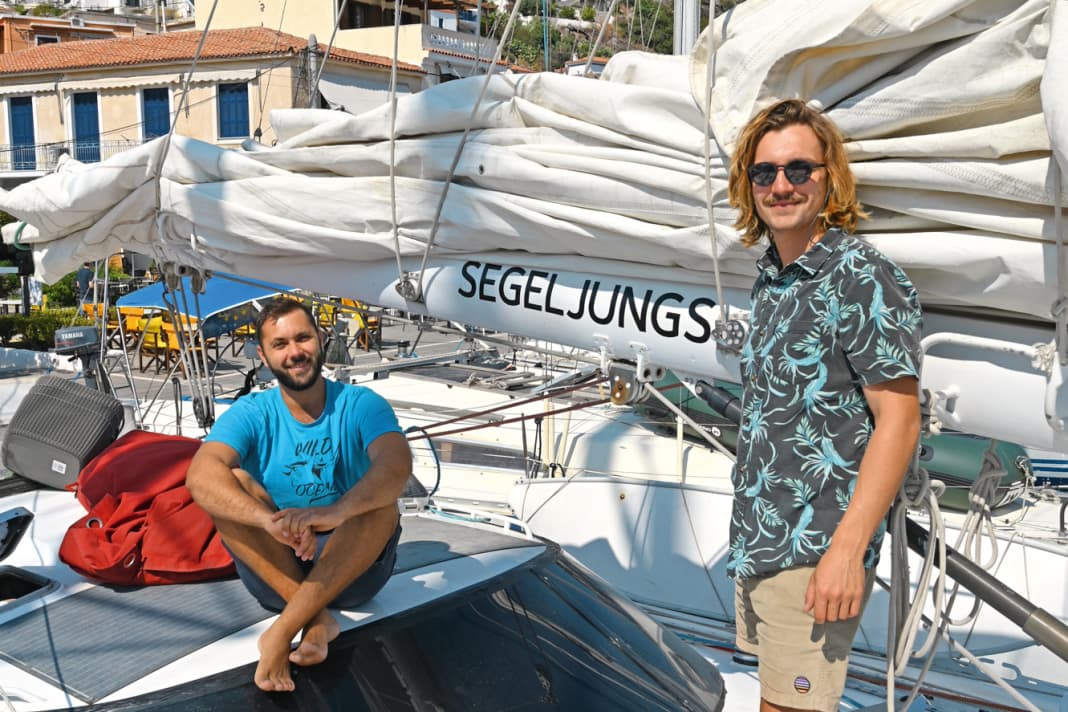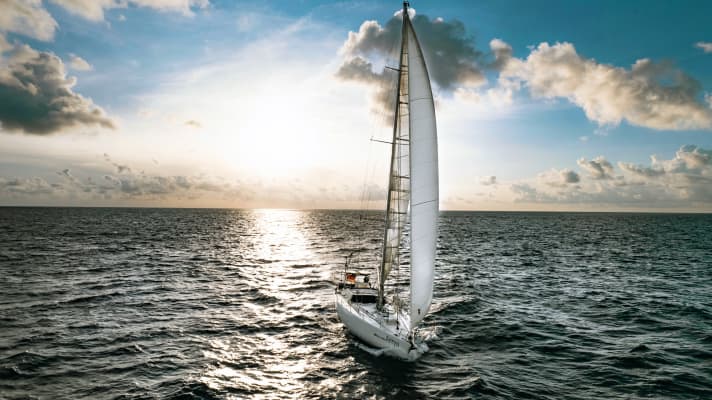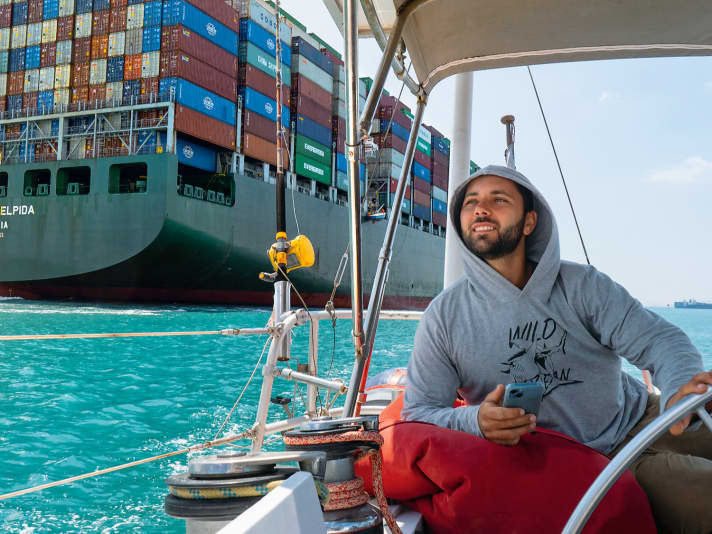YouTube sailors: Sailing boys take stock - "We've done what many dream of"
Johannes Erdmann
· 07.10.2023






Around the world in their own boat! The four friends Tim Hund, Vincent Goymann, Tom Schwarz and Michael Bischof took the plunge straight after leaving school. In September 2018, they set off on their old steel ship "Eira" on the Baltic Sea to sail "once around" in three years. To finance the project, they produced regular YouTube videos from the very beginning. The "sailing boys" channel quickly attracted a large number of followers. However, the dilapidated ship caused increasing problems, so that the crew in Panama was already facing the ruins of their dream. Until one of their fans made them an incredible offer: he offered the boys a 57-foot aluminium yacht at a price they couldn't say no to and - more importantly - that they could afford.
Five years after their departure, the sailing boys are now only two people, but they have actually travelled around the world. On their voyage, they always had individual fellow sailors with them, but above all, there were always tens of thousands of virtual fellow sailors on board!
YACHT: Tim and Vincent, you've just returned. How many miles do you have on the log?
Vincent: With the first year on "Eira", that must be well over 40,000 nautical miles. But we also had two attempts.
How did you come up with the idea of sailing around the world back then? Or were you already sailors before the trip?
Tim: Before the trip, I had already been in contact with sailing people and had been on a charter trip to Sardinia for a fortnight. Nevertheless, nobody had any idea exactly what was in store for us.
So why did you choose a boat and not a van or campervan?
Vincent:Tim threw the idea of a boat into the room relatively early on, and the rest of us were all immediately enthusiastic. Because you have no limits with a boat. With a car, you're always by the sea at some point. But the oceans connect the whole world, all the continents. Sailing is also sustainable. And it was a challenge for us - to learn something we didn't know how to do yet.
What was the reaction of your friends?
Tim: We first announced our travel plans after we presented a film about a kayak tour in Spain in a cinema: "... and next we'll be sailing around the world!" Nobody really wanted to believe it. But when we bought the boat, our parents realised that we were serious.
Vincent:Everyone who had no idea about sailing thought we were crazy. Only the sailors said: "You'll manage!"
How did you think you would manage the financing so soon after leaving school?
Tim: We pooled our savings and had enough in the till for a year. It was clear that we had to earn money with social media quite quickly.
Vincent: In the beginning, we split up: Two prepared the boat, two earned money. But despite the reserves, the first year was really tight. We had to save money. We couldn't afford a can of cola.
Your original plan was to be over in three years ...
Tim: ... and then there were five. But the calculation of earning money worked out. After just over a year, the income covered the travelling expenses.
Your main channel is YouTube. Have you produced videos before?
Tim: The camera has actually always been with us, on every weekend trip or adventure we've had. Back then, however, it was more of a hobby.
How was the distribution of roles? Filming and staging situations is work.
Tim: There were no rules, but we always handed each other the camera: "Here, film this!" Vince and I grew into it a bit more.
Vincent: Tim edited the videos.
At the moment, a lot of people are buying boats and setting off without any travel funds, firmly convinced that they can earn money via YouTube. What do you say to them?
Tim: It is important not to rely on YouTube alone, but to have at least enough money in your pocket for a year. Because it's by no means the case that you earn enough money straight away. It takes quite a while.
Vincent:And you have to get people on board right from the start. Starting half-heartedly won't work.
Tim: A good concept is important. And a lot of passion, hard work and creativity.
And probably also a charming story and a likeable personality. What else does the success of such a channel depend on?
Tim: Authenticity! Filming even when you don't feel like looking into a lens. In highs and lows. And continuity. YouTube is not a sure-fire success. You have to post regularly, otherwise viewers will forget about you.
Vincent:And you really have to enjoy it. If you're not interested in cameras, you can't do it. The viewers realise that. We enjoyed sharing our journey right from the start.
Which videos were the most popular?
Tim: The pirate videos.
Vincent: And great ocean crossings.
Your first boat was a kind of soul seller. With the second one, on the other hand, people were a little worried that you would have to sell your soul for it and that the charm of the journey would be lost with the giant ship. Did you notice that in the reactions?
Tim: No, there was even a significant increase in the number of spectators. Suddenly, we were no longer the guys with the soul seller, but had a boat to be taken seriously.
Vincent:We were also a bit worried about whether that would come across the wrong way. But the "Arrya" is not a luxury ship with air conditioning, but a rather special long-distance ship with an expedition character. Our followers were therefore quite positive about the change.

A 57-foot aluminium yacht must have cost you the shirt off your back, mustn't it?
Tim:It really ate up a lot of money. Everything that broke was expensive. And spare parts were not always available. For example, the seven-metre-long shaft broke and had to be replaced, and the sails were constantly being mended. And there were repeated electronic problems. Boatyard visits were also expensive, as such a large boat always needed a few cans of paint and antifouling.
You had major problems with your engine at the entrance to the Red Sea. How were you able to fix them?
Tim: It smelled burnt on the crossing to Djibouti. A remote diagnosis quickly made it clear that the cylinder head would have to be sent to Germany for repair, but that was unaffordable because we would have had to pay customs duty on re-importing it. So I flew home with the injection nozzles in my luggage and went to a workshop there to find out how to repair the engine.
VincentWhat a feeling when the engine was running again and we could carry on!
Are you still happy with the ship?
VincentIt was the ideal ship for our trip. Built to sail around the world with a small crew. Super stable and safe, fast and comfortable.
Yet you want to sell the boat now?
Tim: The journey is over, and we can't afford to keep maintaining the boat without travelling far.
Vincent: That's why we want to give a new crew the chance to have just as great an experience as we did.
After the restart of the voyage in October 2019, the sailing team halved in size. How did that happen?
Tim: For personal reasons. It had nothing to do with stress among us boys or anything like that. The trip took longer than planned, and life plans change. But Vince and I wanted to carry on.
Were you worried about travelling in pairs on the big ship?
Tim: We didn't know the ship that well yet and didn't have an autopilot. But we knew that we could get people on board to help us if necessary. In the meantime, "Arrya" can be sailed almost single-handed.
Vincent:We ended up taking a friend and a hitchhiker with us across the Atlantic.
You had a lot of virtual co-sailors. How did you perceive that?
Vincent:We really realised this at the end. When we arrived, we received messages from followers telling us that they had tears in their eyes when they tied up. And that they would miss something because we had become part of their lives during the five years.
Tim: Around 15 people have written to us: "Hey, you've inspired me so much, I've just bought a boat!" Quite a few have started with a sailing licence.
We seem to have inspired a lot of people. A number of people have written to us saying that they bought a boat themselves because of our videos."
VincentOlder people have told us that we are living their dream. Back then, it wasn't possible for them because there was no internet and no way to earn money this way. Now they have joined us virtually.
Did you meet any fans along the way?
Vincent: Many sailors knew us. But we had the funniest story in Sri Lanka. Someone had written to us shortly beforehand: "Maybe we'll meet at sea, I'm also travelling off Sri Lanka at the moment." When we were at sea, a huge freighter came right up to us and honked its horn loudly. The man, our fan, was the first officer on the freighter.
You were travelling the barefoot route, with a detour to Mexico. Wasn't that a tough trip up there?
TimThere's a reason why nobody sails up there. It was very exhausting against the wind and current. The weather was unstable, changing winds, calm and strong winds. Lots of rain and thunderstorms.
Was the trip to Baja California at least worth it?
VincentAbsolutely. Mexico was the most exciting country on our trip!
Tim: We had a really great time there, we learnt to dive and freedive and saw lots of fish and animals. We dived with orcas and swam with blue whales!
Vincent: And because we were in one place for a long time, we made a lot of friends there in La Paz, did things with them and lived a normal life for people in their mid-twenties.
At the time, the coronavirus pandemic had already broken out, which brought with it many restrictions. Was that the reason for your trip to the USA?
Vincent: We made full use of our visa there and spent three months travelling around the USA in a van. That was a nice contrast to sailing.
Tim:Above all, it was an alternative to the corona lockdowns. It allowed us to continue travelling instead of being on standby. French Polynesia was completely closed and no more yachts were allowed in.
Vincent: So we had to make a little time ...
Tim: ... and produce videos. That's the curse and blessing of YouTube: If you don't produce anything, you don't earn any money and people forget about you. The same applies if you post irrelevant stuff. That's why the van tour through the USA was a good opportunity for us to make the best of the situation and get to know the country.
How did you find the ocean crossings?
Vincent: I like to think back on that. 40 days at sea. That really pushed us to our limits. At the same time, I enjoyed surfing down the long waves. Sometimes I had to pinch myself to see if it was real.
Which people were the most hospitable where?
Tim: The people on Socotra, an island that belongs to Yemen. We felt really welcome there, we were invited by people who have nothing themselves, who only live on rice and dates, but who were nevertheless happy to host us and let us share in their lives. I found that very moving.
Which authorities have made life difficult for you?
Tim:The one in Indonesia.
Vincent:Singapore was also exhausting.
Which country did you not like at all?
Both: Djibouti.
In which situations have you ever been worried or even afraid?
Tim: Worries are of course a constant companion on such a journey, always associated with the boat. You worry whether the anchor will hold and that nothing will break. However, we were rarely afraid.
Vincent:Definitely in the extreme thunderstorms between Panama and Mexico. That was scary. And in Djibouti, because there we were afraid that the journey was over. We were also worried after the repair whether the engine would hold out.
What made you decide to travel through the Suez Canal instead of around South Africa?
Tim: We ran out of time a little and the route was shorter. Rounding Africa would have been a dream and would probably have felt more worthy of such a circumnavigation. But we wanted to finish the journey this year, and that would have been a very strenuous diversions.

You finished your trip at the end of August in Port-Saint-Louis on the Rhone and already have big plans for the future. What do they look like?
Tim: We definitely want to remain independent and active on social media. Our content will logically change, but we have some ideas and could also imagine producing educational sailing videos, for example. We are also planning to record our trip in a cinema film and market it.
Vincent: We can also imagine a kind of meeting with our community and are already securing venues for this. We are also planning a tour of Germany, where we want to give presentations in the biggest cities. There are so many things that we haven't been able to put into videos, stories that haven't been told or haven't been told to the end yet.
You've just spent a week in Bad Tölz. How is it back home?
Vincent: It's great to meet up with family and friends, to climb our local mountains again. I haven't been home for two and a half years, Tim for four.
Tim: You really appreciate home when you've been away for a long time.
Were you tired of travelling after five years?
Vincent: At least I have the feeling that I'm ready for something new.
Tim: I feel the same way.
VincentWe really enjoyed the last few miles in the Mediterranean: great sailing wind, old towns, lots of culture, short distances, beautiful bays and always good and affordable food. A really nice "grande finale".
The journey has been long, now we are ready for something new. We want to stay active on social media. And: We are planning a cinema film!"
You have experienced a lot of freedom. Are you worried that this is now so ingrained in you that you will be itching to set off again every few years?
Tim:That can happen. It's difficult to estimate how long it will take. Hopefully not just a few months. But it's possible that wanderlust will now accompany us.
Vincent:I also see that as an advantage. With a lot of luck and naivety, we have learnt what is possible. It's good to know that you can start a new project again when it's time.
Were there any promises to your parents that you would "come to your senses" after your return?
Both: Fortunately not (laugh).
Vincent:I'm not ruling out the possibility of starting a degree programme. After all, I'm only 23 years old. Although we want to move to different places, we both feel the need to find a "home base".
Tim:A place where we are at home, but from where we can also start something new again.
If you were to give freshly graduated school leavers some advice for a planned trip, what would it be?
Tim: Just get started! Have the courage!
Vincent:I also think that all the mistakes we have made are just as much a part of it. We are a little more experienced and wiser than we were five years ago. But we had to gain all that experience first. Including some mistakes.
How did the trip shape you, what personality-changing insights will you take back with you to life in the country?
Vincent:I have learnt that situations can change very quickly. Then you don't have to be annoyed that a good plan doesn't work out because everything has turned 180 degrees. Instead, you should accept the new situation, readjust your sails and make the best of it. It always goes on. Setbacks often turn the next one or two months upside down. However, new doors always open up - often hiding exciting experiences.

